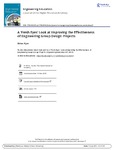A ‘Fresh Eyes’ Look at Improving the Effectiveness of Engineering Group Design Projects
| dc.contributor.author | Kyte, Adam | |
| dc.date.accessioned | 2017-07-13T08:45:08Z | |
| dc.date.available | 2017-07-13T08:45:08Z | |
| dc.date.issued | 2015-12-15 | |
| dc.identifier.issn | 1750-0044 | |
| dc.identifier.issn | 1750-0044 | |
| dc.identifier.uri | http://hdl.handle.net/10026.1/9617 | |
| dc.description.abstract |
Whilst there are many benefits of the use of Engineering Group Design Projects (EGDPs) in undergraduate engineering programmes, there are a number of common issues that can compromise their effectiveness as a learning medium. A study was carried out to identify such issues, which used creative thinking methods to identify ways in which they might be addressed. Focus was upon aligning project structure with that typical of industrial practice - a goal enhanced by the fact that the author was from an industrial rather than an academic background. As a result, a proposed EGDP structure was developed and trialled at Plymouth University. A key feature of this structure was that the minutes of students' weekly project management meetings were recorded in a spreadsheet-based template which doubled as the project mark sheet. Each individual task recorded in the minutes was peer assessed on completion to adjust the group mark awarded by the lecturer, thus reflecting individual contributions. The trial was a resounding success with excellent student feedback. Resulting design work was of exceptional quality, and the age-old issue of non-contributing group members was effectively eliminated. © 2013 J. Davies. | |
| dc.format.extent | 81-97 | |
| dc.language | en | |
| dc.language.iso | en | |
| dc.publisher | Informa UK Limited | |
| dc.title | A ‘Fresh Eyes’ Look at Improving the Effectiveness of Engineering Group Design Projects | |
| dc.type | journal-article | |
| dc.type | Journal Article | |
| plymouth.issue | 1 | |
| plymouth.volume | 8 | |
| plymouth.publisher-url | http://www.tandfonline.com/doi/pdf/10.11120/ened.2013.00009 | |
| plymouth.publication-status | Published | |
| plymouth.journal | Engineering Education a Journal of the Higher Education Academy | |
| dc.identifier.doi | 10.11120/ened.2013.00009 | |
| plymouth.organisational-group | /Plymouth | |
| plymouth.organisational-group | /Plymouth/Faculty of Science and Engineering | |
| plymouth.organisational-group | /Plymouth/REF 2021 Researchers by UoA | |
| plymouth.organisational-group | /Plymouth/REF 2021 Researchers by UoA/UoA12 Engineering | |
| plymouth.organisational-group | /Plymouth/Users by role | |
| plymouth.organisational-group | /Plymouth/Users by role/Academics | |
| plymouth.organisational-group | /Plymouth/Users by role/Researchers in ResearchFish submission | |
| dcterms.dateAccepted | 2013-07-01 | |
| dc.identifier.eissn | 1750-0044 | |
| dc.rights.embargoperiod | No embargo | |
| rioxxterms.versionofrecord | 10.11120/ened.2013.00009 | |
| rioxxterms.licenseref.uri | http://www.rioxx.net/licenses/all-rights-reserved | |
| rioxxterms.licenseref.startdate | 2015-12-15 | |
| rioxxterms.type | Journal Article/Review |


